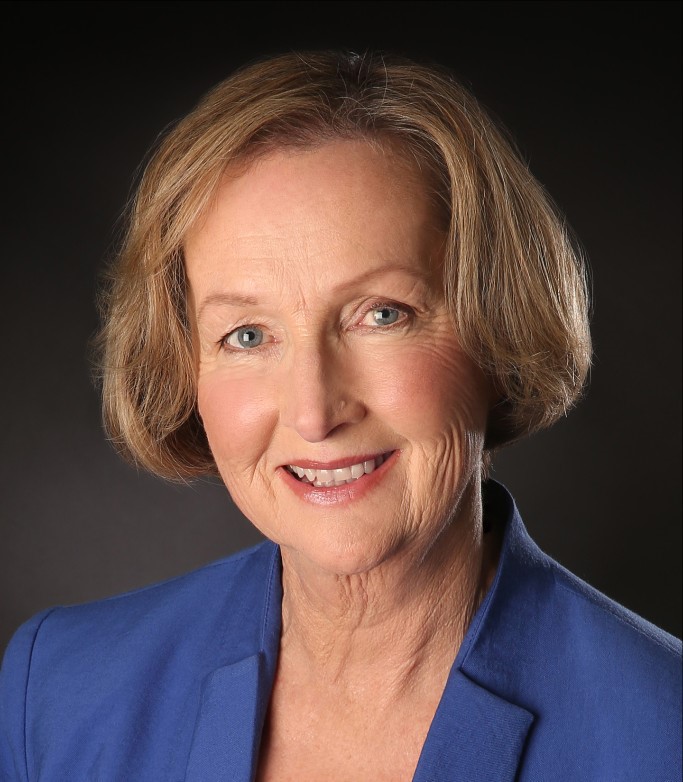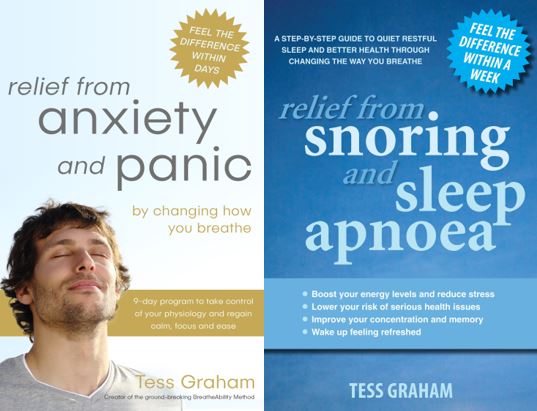IAAN Member Training
(meets IAAN professional development requirements)Essential Breathing Skills in Clinical Practice
2 Day Workshop - Manly, Sydney
Thursday & Friday 20-21 February 2020
Presenter - Tess Graham, Physiotherapist, Breathing Educator
Tess Graham has been researching and writing about breathing dysfunction for 25 years. Through extensive clinical practice she has uncovered the essential principles of good breathing and applied them in the simplest way to achieve extraordinary outcomes. Tess is an internationally recognised authority on breathing, sleep and sports performance. Tess has taught breathing retraining to over 6500 people and has a diploma in the Buteyko Breathing Method from Moscow.

Tess is the author of Relief from Snoring and Sleep Apnoea (Penguin 2012) and Relief from Anxiety and Panic (2017).

This Level 1, 2-day workshop, is highly experiential and content rich and has immediate clinical application. It is a science and evidence-based approach.
The workshop provides a revolutionary understanding and application of breathing that is a powerful tool to enhance clinical outcomes. It uses “breathing retraining” to address the dysfunctional baseline (everyday) breathing patterns that disturb physiology, blood and brain chemistry, and which underlie and aggravate many chronic mental and physical disorders prevalent today, including:
Anxiety & Panic Disorders | PTSD | Insomnia | Sleep Apnoea | Asthma
The workshop is followed by a 2-month mentoring program via Zoom (webinar) (2 x 60-min sessions). Total CPD hrs 16.
Designed for psychologists, neuropsychotherapists, counsellors, social workers, clinical hypnotherapists and other therapists who want to enhance their effectiveness with breath work and breath management within their modality.
By restoring physiologically normal breathing, “breathing retraining” down-regulates primitive systems in the medulla-breathing and heart rate, balances blood chemistry, optimises oxygenation, and promotes the parasympathetic state. This is a vital key to effectively working on higher order systems-emotion and cognition.

TRAINING DATES:
SYDNEY, Manly – Thursday & Friday 20-21 February 2020
MORE INFORMATION Click here
COURSE FEEDBACK
This workshop immediately changed my teaching of breath. I have carefully integrated what I learnt into my teaching and I have seen the benefit to clients, to be a calmer, more rhythmic breathing pattern, requiring less effort and assisting them to relax physically and mentally.
Jakki Tobin – physiotherapist, Pilates instructor, Sydney
After completing the two-day training with Tess Graham in 2017, I began to observe my clients with fresh eyes. I noticed that over 80% of anxiety/trauma clients were mouth-breathers and had postures that reinforced their dysfunctional breathing. By implementing the BreatheAbility approach, I immediately observed clients experiencing and reporting easier, more stable results. This was not merely symptomatic relief but a foundation for ongoing, sustainable change for clients. As one client remarked: “I’ve now taken my life back by being able to manage my panic with an effective tool as breath retraining”.
Alex Zannoni – Mental Health Social Worker/Clinical Hypnotherapist/Clinical Neuro-Psychotherapist; Director of Melbourne Trauma & Grief Services
Breathing retraining has been an important tool in my repertoire of treatment strategies for over twenty years. However, completing Tess’s course has completely changed the way I understand and address breathing issues among my clientele. Adopting her techniques has led to rapid progress in symptom relief early on in treatment, contributing to greater gains in therapeutic progress overall.
Fiona Sandilands – clinical psychologist, ACT
I am amazed by how rapidly comfortable nasal breathing can be restored in chronic mouth-breathing children in my practice through applying the simple postural and breathing adjustment techniques I learnt in this course. This transformation did not require the time and effort commitment of other approaches I had tried, nor does this approach involve taping of the mouth.Robynann Williams, B.App.Sc. (Speech Pathology) speech pathologist and orofacial myologist, Sydney
I am amazed by the usefulness of these simple techniques. I am able to help my clients with various chronic conditions including deconditioned, neurological and COPD to achieve better breathing control and improve on their mobility and balance more easily. May Kwan, community physiotherapist, Brisbane
This is a very worthwhile course for a physiotherapist wanting to enhance their knowledge and skills around breathing. In addition, providing breathing retraining programs has added a new dimension to my practice.
Kate Milne – Breathing Matters, Countrywide Physiotherapy, Angaston SA
Earlier this year I was given a copy of Tess Graham’s first book and suddenly I felt as though I had hit the proverbial ‘jack pot’. The approach that Tess has developed over 25 years – BreatheAbility® – perfectly blended everything I had learned about breathing science up until then (and then more) in a way that deeply resonated with me and my clinical style. So, when the opportunity to train and mentor with Tess in Byron Bay presented I knew I absolutely had to find a way to make the long sojourn from Canada. Learning directly with Tess was such a special and life changing experience. Heather Grieve BSc. PT, RPT, Ontario Canada
Learning Outcomes
At the end of the training attendees will be able to:
- To identify and address dysfunctional breathing habits
- Relevant physiology of breathing
- Mechanical, physiological, neurological, psychological and biochemical effects of dysfunctional breathing
- Myths and misunderstandings about breathing
- Techniques to restore regular, comfortable, nose-diaphragm breathing with good posture and balanced O2/CO2
- Strategies to facilitate deep relaxation and relieve and prevent the stress response, breathlessness, panic attacks, snoring and insomnia
- Strategies for specific conditions, personality types and scenarios you see in practice
- How to teach clients to integrate better breathing into everyday life
- The food-breathing connection
- Application of physiological normal breathing into breath work in psychological therapy, hypnotherapy, yoga, meditation, cardiopulmonary rehab, and pain management
- How to improve and monitor your own breathing
